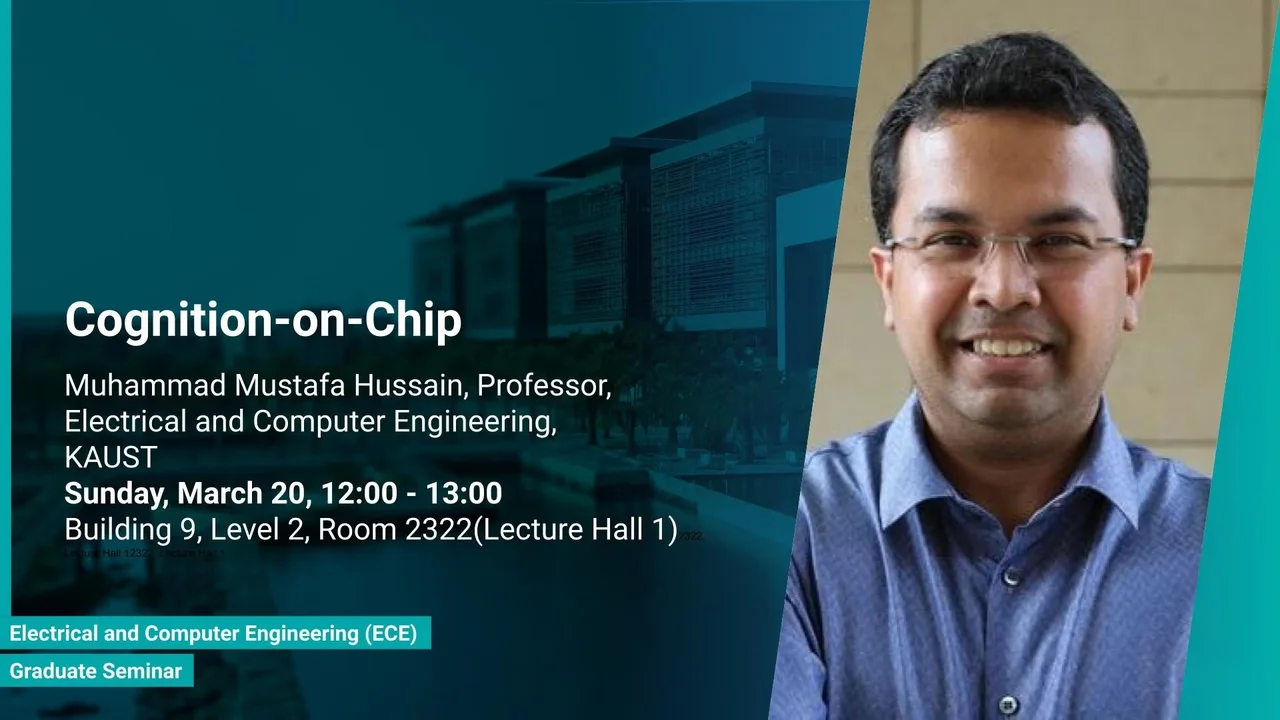
Cognition-on-Chip
B9 L2 R2322 H1
As we grow, expand and experience digital world, we feel the need to interface better with the natural world which is analog.
Overview
Abstract
As we grow, expand and experience digital world, we feel the need to interface better with the natural world which is analog. Our ability to perceive this physical world is significantly limited. Massive amount of data generating everyday cannot be simply transmitted to the cloud continuously due to limited communication capacity, energy and timeliness of information, privacy and security concerns. And therefore obviously the advanced integration strategy for manufacturing of futuristic electronic systems will focus on cognition-on-chip. Such standalone chips will offer energy efficient systems integrating edge computing, sensors and actuators. Let’s think how we gather information, we think, we decide, we take actions. A cognition-of-chip will thus mimic the way our brain works. In this seminar, we will discuss the importance, challenges and opportunities of such cognition-of-chips from heterogeneous integration perspective.
Brief Biography
Dr. Muhammad Mustafa Hussain’s research is focused on designing futuristic electronics to realize his vision about empowering humanity through democratized electronic technology. He earned his PhD in Solid State Electronics from the University of Texas at Austin in December 2005. A portion of his PhD thesis on metal gate induced strain engineering has been used in every single Intel microprocessor marketed since 2008. After graduation, Mustafa lead Texas Instruments’ advanced CMOS device for 22 nm node. In the beginning of 2008, Mustafa joined USA’s largest semiconductor research consortium SEMATECH as the Program Manager of Novel Emerging Technology Program which became a $50M+ research endeavor in less than a year with the direct financial support from US Department of Defense and global semiconductor industries. Due to his passion for academia, Mustafa joined KAUST as a founding faculty and developed his own independent academic career without any conventional pedigree. He graduated 19 PhD students (including 7 women) from a dozen countries who immediately after their graduation in KAUST, joined as researchers in MIT Media Lab, Stanford, University of California Berkeley, Caltech, Harvard, Yale, University of California Los Angeles, University of California Davis, Saudi ARAMCO, NEOM, Boeing, Lockheed Martin, DOW Chemicals, etc.). Currently 7 of them are serving as Professors in different Saudi Universities (KFUPM, KAU, KSU, KFU and the University of Jeddah) and the rest have become industry leaders (in Intel, TSMC, SOITEC, DOW Chemical, Saudi ARAMCO) and successful entrepreneurs in the Bay Area, California. Cumulatively his research group has published more than 375 scientific articles in prestigious venues where Mustafa has served as the first or the corresponding author in 90% of them. Mustafa has also served as the Lead Inventor of more than 75 awarded and pending US patents. His creative research has been highlighted more than 500 times in international media including in CNN, Time, BBC, Fox News, MSNBC, Washington Post, National Geographic, MIT Tech. Rev., Wired, Wall Street Journal, Saudi Gazette, The Guardian, Arab News, IEEE Spectrum, etc. Scientific American has dubbed his lab’s innovation as one of the top 10 world changing ideas in 2014. Mustafa has received numerous global recognitions including Best Innovation Award in the world’s largest consumer electronics show CES 2020, Edison Award 2020, Best Innovation Award in SXSW 2022, UT Austin’s Young Alumni Award 2015, IEEE Outstanding Individual Achievement Award 2016, DOW Sustainability Challenge Award 2012, etc. He currently serves as the Chair of IEEE Electron Devices Society Regions 4 to 6 (Western, Southern and Midwest USA), Chair of the IEEE EDS Technical Committee on Electron Materials, Editor-in-Chief of Applied Nanoscience and an Editor of IEEE Transactions on Electron Devices. Mustafa taught Solid State Electronics related core courses with the record satisfactory evaluation by the students as a Visiting/Adjunct Full Professor of world famous Electrical Engineering and Computer Science Department of the University of California Berkeley (Spring 2019 to Fall 2021). Mustafa is a Fellow of IEEE, American Physical Society and Institute of Physics (UK).